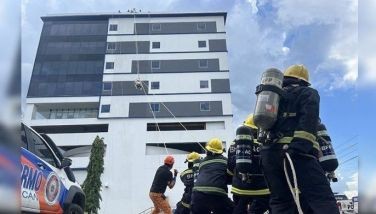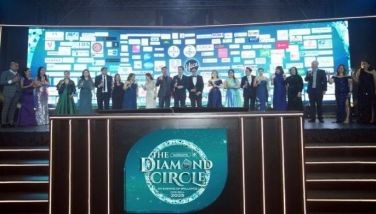Oh Tokyo!
For someone who spent a good majority of her adolescent years obsessed with anime and manga, even I find it surprising that I only visited Japan for the first time last year. And true to tourist form, we did all the expected stops: a quick sweep of Tokyo, a temple run through Kyoto, and a food trip through Osaka, with an overnight stay in Hakone for some yukata-clad ryokan realness. (A ryokan is a traditional Japanese hotel, and the ones in Hakone have their own onsen or hot springs.)
I may have only gotten a bird’s eye view then, but it was enough for me to decide that Japan definitely deserved a spot on my list of countries I wouldn’t mind visiting over and over again, so when an invitation came from the Japan Tourism Agency and the Japan National Tourism Organization to go on a trip to Tokyo, the only possible response was “Hai, arigatou gozaimasu!”
Something interesting I learned over the course of the trip was that Filipinos are presently Japan’s second largest tourist population, and I’m not surprised — it’s not a long flight, there’s a wealth of culture and history to be explored, the food is crazy good no matter where you go, the people are unfailingly polite, and the Uniqlo in Ginza is 12 floors. Who wouldn’t want to be there all the time? (Matter of fact, I really should be there now for Fuji Rock. Sigh.) But you can only go to a place so many times before tiring of doing the same old thing, so a new itinerary is in order.
This time around, Tokyo served more as a base of operations than the focal point of the trip — something I didn't realize could actually be done before now. We flew into Haneda Airport (which has been accommodating international flights since 2010) on an extremely comfortable All Nippon Airways flight that I slept through (with Beyoncé’s latest album blasting into my headphones, from a diverse selection their on-flight entertainment system offered that also included Nirvana’s Nevermind). Thankfully, ANA flies out of NAIA Terminal 3, so we didn’t have to contend with the utter mess that is The Second Worst Airport in the World (looking at you, NAIA 1).
One of my major concerns when it comes to traveling out of the country is ease of transportation. Having flown in and out of Manila countless times, I can only imagine how hard it is for the foreign tourist to get around here in spite of our ability to speak English. (I think it speaks volumes that I take public transportation everywhere else in the world except home.) It seems like every other airport I’ve flown into is linked up to a major public transportation system, so if you’re a traveler on a budget, you can buy a metro card (or whatever the equivalent is) right at the airport, take the train downtown, and get yourself from Point A to Point B with ease. This is definitely the case in Tokyo. Right in the arrivals lobby, the Keikyu Line already has a tourist information center (with customer service representatives who speak fluent English, Chinese, and Korean) where you can purchase a PASMO ticket or card to go anywhere from downtown Tokyo to Shinagawa and Yokohama.
I hopped on a bus, though, and spotted some of the Tokyo landmarks (the Tokyo Tower, Rainbow Bridge) on the way to the Prince Hotel in Shinjuku. Conveniently connected to a metro station, right in front of both a McDonald’s and a conveyor belt sushi restaurant that I only discovered on the last day (I walked several blocks to another one that first night, because when in Japan, you stuff your face with fatty tuna), with a Uniqlo and MUJI (among other stores) in the building, and walking distance from all the shopping, restaurants, and nightlife the Kabukicho area has to offer, it was a great hotel to call home.
The first stop on the tour was Sankeien Garden in Yokohama, which we traveled to by bus. A huge area of lush greenery created by a businessman named Sankei Hara in 1902, I can only imagine how lovely it must look in March, if you’re lucky enough to be there when the cherry blossoms are in bloom, or in autumn, when the foliage goes from green to varying shades of orange, gold, and brown. It must look magical in winter, when everything is capped with snow. There are several pieces of historic architecture within the garden, preserved so you can see how the Japanese once lived.
It was in Sankeien that I got my first taste of a traditional tea ceremony. The making of the matcha tea seemed a sacred and elaborate process (all those steps, to make one cup of tea!), and when some of us were given the opportunity to learn the basics for ourselves, I imagined that it was something I would enjoy practicing — something solemn, deeply respectful, and calming. Plus, a cup of freshly made matcha was the perfect thing on a cool, rainy day.
Manila is currently experiencing a boom in ramen restaurants. I probably need both hands to count how many have opened up in the metro already, and there are likely more on the way because Filipinos just can’t get enough of ramen. If you’re one of them, another necessary stop in Yokohama is the Shinyokohama Ramen Museum, not so much a museum as it is a collection of nine different ramen restaurants, all offering assorted kinds of ramen from different regions of Japan. (The shop selling miso-based ramen came highly recommended, but I stuck to my favorite garlic tonkotsu with lots and lots of chashuu.)
From there, we used our PASMO cards to take the train back to downtown Tokyo, and got off at Shibuya — one stop before ours at Shinjuku — to take a peek at Hachiko and then do that which all tourists must do when in Tokyo: Score that Shibuya crossing shot. The Japanese are so used to this that they don’t even bat an eyelash if you cross the street several times and stop in the middle to take a photo. (Like we did.) Plus, if you’re looking to shop, you can definitely do some major damage to your plastic in this area. (Ever a beauty girl, I left with eight pairs of Dolly Wink false eyelashes.)
The evening was spent gazing upon the Japan we’ve come to expect from anime and major Hollywood blockbusters: fluorescent lights, flashes of neon lining the street, and serious surrealism. After a walk through Shinjuku’s Golden Street, we found ourselves at the Robot Restaurant, an eye-poppingly lit building boasting a show with billions of yen worth of robots and hydraulically-operated machinery (and some really hot girls) duking it out for our entertainment. It was like being transported right into one of the giant robot cartoons I used to watch, complete with the kawaii heroines and crazily-costumed baddies.
Eager for more toned-down entertainment, I took a side trip that night to the Park Hyatt Hotel’s New York Bar, where scenes from Lost in Translation were filmed, to listen to some live jazz, sip a little Lagavulin, and experience that sweet urban loneliness with a view of the Shinjuku skyline. Probably the priciest finger of scotch I’ve ever paid for, but well worth it if you’re a fan of the film.
The next day, we dropped by the Odakyu Service Center in the Shinjuku train station to take their Romancecar (an extremely comfortable train) to Hakone, home of gorgeous mountain vistas and hot springs; a popular vacation spot and close enough to Tokyo that it can definitely be included on any itinerary, whether you’re only there for the day or you want to spend more time. An invigorating half-hour cruise on Lake Ashi was the perfect way to kill some time on a beautiful day, on a ship that looked like something out of Pirates of the Caribbean.
Owakudani (“Great Boiling Valley”) is another Hakone sight that must be seen, where they make black eggs that are said to extend your life by seven years. I didn’t have an egg, but I did have two cones of ice cream: one egg ice cream (which tasted like rich custard), and one black strawberry ice cream (which I had the last time I was at Owakudani; I think the black color comes from being made with ash, but I’m not entirely sure). In colder months, you can see steam rising from the boiling hot springs, hence the name.
It was a hectic itinerary for just two full days, but in Girl World, everyone is instantly reinvigorated when the word “shopping” is spoken. The Gotemba Premium Outlets on the drive home from Hakone could probably have taken up an entire day in itself, with brands like Alexander Wang, Alexander McQueen, Valentino, Maison Martin Margiela, Prada, Miu Miu (I can go on), all at seriously slashed prices. Having already spent most of my pocket money on sushi and scotch, I stared longingly at the Wang then walked away, utterly heartbroken.
I tell everyone who asks what Japan is like that once you have beef in Japan, your life will be forever changed. (As a confessed carnivore, this is the highest praise.) That once you’ve eaten actual Japanese food in Japan, even our best Japanese restaurants (and we have some really good ones) cannot compare. No one ever believes me until they go to Japan and eat for themselves. On my last trip to Tokyo, our guide took us to a robatayaki in Roppongi, where they served us grilled beef that is still seared into my memory. It wasn’t even wagyu. At Ginza Ukai-tei, it was the most unbelievably tender, juicy, and tasty wagyu to ever grace my tongue, along with perfectly cooked sea bass and the best bowl of garlic rice ever made. (Imagine garlic rice made with short-grain Japanese sushi rice. Heaven.) The perfect send-off after an all-too-brief visit, and if only for the beef, I knew I would be back.
With just a few thousand yen of Dad’s money left in my wallet and no intention to do any more shopping, I knew what my last stop in Shinjuku would be: The conveyor belt sushi place across the street, where I would spend every last sen in my pocket on melt-in-your-mouth fatty tuna nigiri, the likes of which you will probably never taste in Manila. A final treat to tide me over until the next trip to Tokyo. (And believe me, there will be a next trip to Tokyo.) It always hurts to say sayonara, but the PASMO card that is still in my wallet (along with those from all the other countries I intend to return to) is a promise to myself — I’ll be back.
















